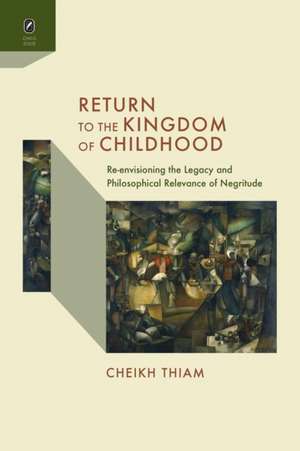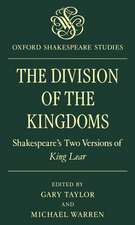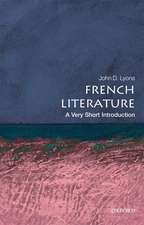Return to the Kingdom of Childhood: Re-envisioning the Legacy and Philosophical Relevance of Negritude
Autor Cheikh Thiamen Limba Engleză Paperback – 31 mai 2016
Return to the Kingdom of Childhood: Re-envisioning the Legacy and Philosophical Relevance of Negritude examines the philosophy of Negritude through an innovative analysis of Léopold Sédar Senghor’s oeuvre. In the first book-length study of Senghorian philosophy, Cheikh Thiam argues that Senghor’s work expresses an Afri-centered conception of the human while simultaneously offering a critique of the Western universalization of “man.” Senghor’s corrective, descriptive, and prescriptive theory of humanness is developed through a conception of race as a cultural manifestation of being.
Thiam contends that Senghor’s conception of race entails an innovative Afri-centered epistemology and ontology. For Senghor, races are the effects of particular groups’ relations to the world. The so-called “Negroes,” for example, are determined by their epistemology based on their fluid understanding of the ontological manifestations of being. The examination of this ontology and its ensuing epistemology, which is constitutive of the foundation of Senghor’s entire oeuvre, indicates that Negritude is a postcolonial philosophy that stands on its own.
The hermeneutics of Senghor’s race theory show that the Senegalese thinker’s pioneering postcolonial philosophy remains relevant in the postcolonial era. In fact, it questions and expands the works of major contemporary African-descended scholars such as Paul Gilroy, Edouard Glissant, and Molefi Asante. Thiam’s approach is thoroughly interdisciplinary, combining perspectives from philosophy, literary analysis, anthropology, and postcolonial, African, and cultural studies.
Thiam contends that Senghor’s conception of race entails an innovative Afri-centered epistemology and ontology. For Senghor, races are the effects of particular groups’ relations to the world. The so-called “Negroes,” for example, are determined by their epistemology based on their fluid understanding of the ontological manifestations of being. The examination of this ontology and its ensuing epistemology, which is constitutive of the foundation of Senghor’s entire oeuvre, indicates that Negritude is a postcolonial philosophy that stands on its own.
The hermeneutics of Senghor’s race theory show that the Senegalese thinker’s pioneering postcolonial philosophy remains relevant in the postcolonial era. In fact, it questions and expands the works of major contemporary African-descended scholars such as Paul Gilroy, Edouard Glissant, and Molefi Asante. Thiam’s approach is thoroughly interdisciplinary, combining perspectives from philosophy, literary analysis, anthropology, and postcolonial, African, and cultural studies.
Preț: 228.03 lei
Nou
Puncte Express: 342
Preț estimativ în valută:
43.63€ • 45.56$ • 36.11£
43.63€ • 45.56$ • 36.11£
Carte tipărită la comandă
Livrare economică 31 martie-07 aprilie
Preluare comenzi: 021 569.72.76
Specificații
ISBN-13: 9780814252956
ISBN-10: 0814252958
Pagini: 162
Dimensiuni: 152 x 229 x 13 mm
Greutate: 0.25 kg
Ediția:1
Editura: Ohio State University Press
Colecția Ohio State University Press
ISBN-10: 0814252958
Pagini: 162
Dimensiuni: 152 x 229 x 13 mm
Greutate: 0.25 kg
Ediția:1
Editura: Ohio State University Press
Colecția Ohio State University Press
Recenzii
“After reading Cheikh Thiam’s book, I believe it will be an excellent addition to the re-surging and growing literature on Léopold Sédar Senghor. Thiam’s scholarship opens up the possibility of situating Senghor’s work at the center of the debate in/on African philosophy. It is a most welcome development in African philosophy and African studies generally.” —Dismas A. Masolo, professor of philosophy and Justus Bier Professor of Humanities, University of Louisville
“Return to the Kingdom of Childhood is well written, clearly and powerfully argued, with an impressive combination of close reading, theory, and more personal commentaries. Cheikh Thiam demonstrates a thorough knowledge of L. S. Senghor’s extensive life, work, and ideas. His powerful and insightful argument will open a new conversation on Negritude in Panafrican, African, French, and postcolonial studies.” —Lydie E. Moudileno, professor of Romance languages, University of Pennsylvania
Notă biografică
Cheikh Thiam is assistant professor of French and African and African-American Studies at The Ohio State University.
Cuprins
Introduction—Decolonialitude: The Brighter Side of Negritude
Chapter 1–The Limits of the Colonial Paradigm: Negritude and Its Critique
Chapter 2– Negritude, Epistemology, and African Vitalism
Chapter 3–Métissages
Chapter 4–Negritude Is not Dead!
Conclusion
Chapter 1–The Limits of the Colonial Paradigm: Negritude and Its Critique
Chapter 2– Negritude, Epistemology, and African Vitalism
Chapter 3–Métissages
Chapter 4–Negritude Is not Dead!
Conclusion
Descriere
Examines the philosophy of Negritude through an innovative analysis of Léopold Sédar Senghor’s oeuvre.












